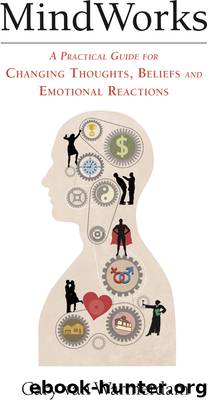MindWorks by Gary van Warmerdam

Author:Gary van Warmerdam [Warmerdam , Gary van]
Language: eng
Format: epub
ISBN: 9780990584612
Publisher: BookBaby
Published: 2014-05-16T16:00:00+00:00
Victim I’m sad at what I’ve lost. Sad.
Victim I feel rejected because she no longer wants me. Unworthy.
Victim I miss her.
I am alone. Associated belief: I am lonely. Nobody wants me.
Lonely.
Worthless.
Hero/Fixer
(with a compensating strategy to shift his emotions) I want to win her back. That will make me feel better.
Multiple thoughts of strategy on what he can do to get her attention.
Imagines her wanting him back. Hopeful: This will change how she feels about him.
Feeling accepted, loved, wanted.
Pleaser
(alternate compensating strategy to shift emotions)
I’ll remake myself into what she would want. Hopeful but feeling false and inauthentic.
Victim Why should I remake myself for her? She is the one who dumped me. Hurt, rejected.
Judge She hurt me.
She is a bad person. Righteous, authoritative, empowered.
Enforcer/Villain She deserves to be punished for the way she hurt me. Angry.
Judge She is a bad person.
By comparison I am a better person than her. Righteous, proud.
Entitled Princess I’m much better than her. I deserve to be with someone better than her. Feeling worthy, positive, better than her.
As a result of all the different perspectives, conflicting stories, and emotions, Richard is confused about what to do and what to believe. All these emotions, driven by the faith he’s invested in these characters from long ago, are powerful and drive his attention.
Every time Richard considers an idea from its archetype character perspective it seems to make sense. That’s because each belief creates an emotion and the emotion is incorrectly being used to determine what “feels true.” The Victim feels rejected and unworthy within its belief bubble of self-rejection. At the same time the Princess feels entitled from within her belief bubble. Each character’s story appears true from its own perspective, while the others appear false. And now they’re all chiming in with their own stories of what happened, why it happened, and what he should do about it. Only by stepping outside these characters and into an observer perspective will Richard be able to see them side by side and recognize the contradictory and false nature of his belief system.
With the awareness gained from an observer perspective, we can begin to see a more fundamental problem. Richard’s mind goes through different cycles of emotions because he doesn’t have control over his attention or his perspective. He has also invested faith in the beliefs underlying these characters for many years. The power of his faith is what pulls him into these perspectives and belief bubbles. The problem is not that Richard is weak or powerless. In fact, he is quite powerful. The problem is that he has used his personal power over years in the form of faith to build these belief structures and characters in his mind, even if he hasn’t been aware of what he was doing.
Even when Richard has enough awareness to see what his mind is doing, it doesn’t mean that he has the personal power and control to immediately stop it. In the beginning it might take all his power just to remain halfway in the observer mode.
Download
This site does not store any files on its server. We only index and link to content provided by other sites. Please contact the content providers to delete copyright contents if any and email us, we'll remove relevant links or contents immediately.
Solve for Happy by Mo Gawdat(2509)
What I Need by J. Daniels(2076)
The Gravity Between Us by Kristen Zimmer(2071)
The Empath's Survival Guide by Judith Orloff(2057)
The Little Book of Lykke by Meik Wiking(2051)
Stop Being Mean to Yourself: A Story About Finding the True Meaning of Self-Love by Melody Beattie(1992)
Anxious for Nothing by Max Lucado(1968)
The Emotionally Absent Mother by Jasmin Lee Cori(1834)
Jealousy by Osho(1749)
Just Life & Love by A.E. Jones(1746)
What a Time to be Alone by Chidera Eggerue(1743)
Emotional Agility: Get Unstuck, Embrace Change and Thrive in Work and Life by Susan David(1689)
Who Says You Can't? YOU DO by Daniel Chidiac(1580)
Habits of a Happy Brain by Loretta Graziano Breuning(1580)
Think Happy to Stay Happy by Becca Anderson(1515)
Manipulation: A Guide to Mind Control Techniques, Stealth Persuasion, and Dark Psychology Secrets by Deborah Weiss(1514)
Persuasion: Learn Techniques in Manipulation, Dark Psychology, NLP, Deception, and Human Behavior by Tori Dasani(1472)
A Liberated Mind by Steven C. Hayes PhD(1418)
When Pride Still Mattered by Maraniss David(1408)
